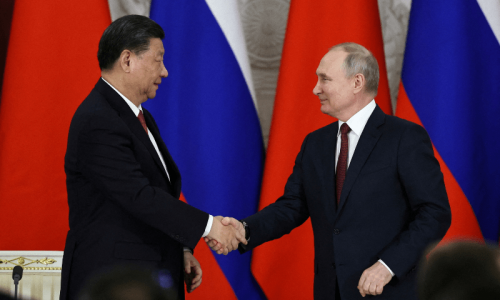KHARTOUM: Protest leaders resumed talks with Sudan’s military rulers on Tuesday seeking to build on a political breakthrough overshadowed by deadly shootings that Washington blamed on the generals.
The protest movement is demanding a civilian-led transition following 30 years of ironfisted rule by president Omar al-Bashir, but the generals who toppled him have been holding onto a leadership role.
An army major and five protesters were killed by unidentified gunmen at a long-running sit-in outside military headquarters in Khartoum late on Monday, just hours after the two sides announced they had reached agreement on the structure and powers of bodies that will oversee a transition.
The Alliance for Freedom and Change — the protest movement umbrella group negotiating with the ruling military council — said the shootings were an attempt to “disturb the breakthrough”.
The military council said it had “noticed some armed infiltrators among the protesters” at the sit-in, but did not identify them. On Tuesday, the United States blamed the army itself for the deaths.
They “were clearly the result of the Transitional Military Council trying to impose its will on the protesters by attempting to remove roadblocks”, the US embassy said on its Facebook page.
“The decision for security forces to escalate the use of force, including the unnecessary use of tear gas, led directly to the unacceptable violence later in the day that the TMC was unable to control,” it said.
Protest leaders, who on Monday had blamed the remnants of Bashir’s regime and allied militias, changed their stand on Tuesday.
“We put the whole responsibility on the military council for what happened yesterday because it’s their direct responsibility to guard and protect the citizens,” Mohamed Naji al-Assam, a prominent figure in the movement, told reporters.
On the political track, protest leaders remained locked in talks with council representatives expected to focus on the composition of transitional bodies to run the country. The protest movement has demanded they have civilian majorities.
The military is ready to accept a mainly civilian cabinet but has been demanding a military majority in a proposed sovereign council that will have the final say on matters of state.
Also on the agenda was the duration of the transition, with the military calling for a two-year timeframe, while the protesters want four years to allow time for preparatory reforms.
The latest round of talks which opened on Monday come after a break in negotiations that saw protest leaders threaten “escalatory measures” to secure their central demand of civilian rule.
The issue has kept protesters camped outside army headquarters around the clock ever since Bashir’s overthrow.
The sit-in has become the focal point for the protest movement, overtaking the near daily protests that had been held across Sudan while the veteran president remained in power.
Published in Dawn, May 15th, 2019











































Dear visitor, the comments section is undergoing an overhaul and will return soon.